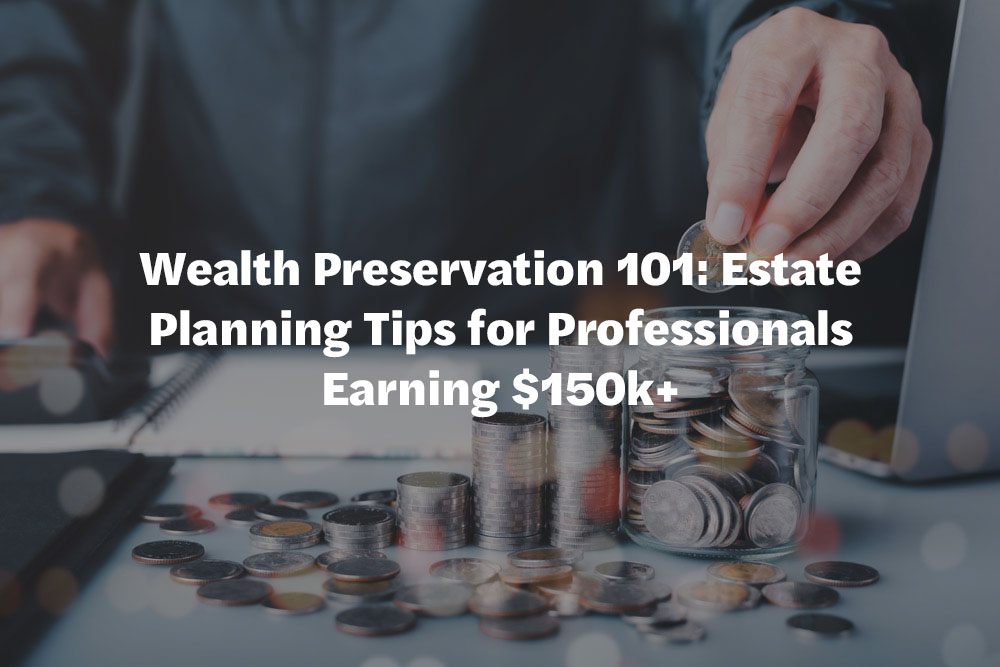For professionals earning over $150,000 annually, effective estate planning is crucial to manage and preserve wealth. High-income earners face unique financial challenges and opportunities, making it essential to implement strategic estate planning to protect assets and ensure they are passed down as intended. Here are key estate planning tips tailored for professionals with significant incomes.
Understand Your Estate Planning Goals
Start by clearly defining what you want to achieve with your estate plan. Common goals for high-income professionals include:
- Asset Protection: Shielding your wealth from lawsuits, creditors, and claims.
- Tax Minimization: Reducing the impact of estate taxes and other tax liabilities.
- Legacy Planning: Ensuring your wealth supports your family, charitable causes, and other interests beyond your lifetime.
Key Estate Planning Strategies
- Use of Trusts: Trusts are a cornerstone of advanced estate planning. They offer control over how and when your assets are distributed, and can provide significant tax benefits and asset protection.
- Revocable Trusts allow you to maintain control over the assets during your lifetime but become irrevocable upon your death.
- Irrevocable Trusts are used to permanently remove assets from your estate, reducing your taxable estate.
- Maximize Retirement Contributions: For high earners, maximizing contributions to retirement accounts not only secures your future but also reduces your taxable income. Consider options like 401(k)s, IRAs, and other retirement vehicles that offer tax advantages.
- Life Insurance Strategies: Life insurance can play a pivotal role in estate planning by providing liquidity to pay estate taxes and support dependents without the need to liquidate other assets.
- Irrevocable Life Insurance Trusts (ILITs) can remove the proceeds of life insurance from your estate, avoiding estate taxes on those funds.
- Charitable Giving: Charitable lead trusts and charitable remainder trusts can reduce your taxable estate while fulfilling philanthropic goals. Donor-advised funds are another option for charitable giving with tax benefits.
- Annual Gifting: Take advantage of the annual gift tax exclusion to gradually transfer wealth out of your estate tax-free. This can significantly reduce your taxable estate over time.
- Legal Instruments for Incapacity: Include durable powers of attorney and healthcare directives to manage your affairs if you become incapacitated. This is crucial for uninterrupted management of your financial and personal decisions.
Special Considerations for High-Income Professionals
- Asset Valuation: Regularly assess and update the valuation of your assets, especially if you own businesses, real estate, or have investments that fluctuate in value.
- Succession Planning: If you own a business, develop a clear succession plan to ensure smooth transition and minimal disruption.
- Legal and Tax Advice: Estate planning for high-income individuals often involves complex financial considerations that require specialized knowledge. Regular consultations with an estate planning attorney and a tax advisor are vital.
For professionals earning over $150k, sophisticated estate planning is essential to preserve and enhance wealth while ensuring your legacy is carried out according to your wishes. By strategically using trusts, maximizing tax advantages, and preparing for all contingencies, you can protect your wealth and provide for future generations. At Allenby Law in San Diego, we specialize in creating tailored estate plans that meet the unique needs of high-income professionals. Contact us today to develop an estate plan that safeguards your assets and secures your legacy.



